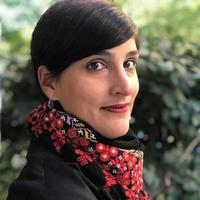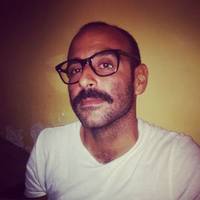Redrawing the Arab World
This collaboration brings Uchicago Assistant Professor Ghenwa Hayek (Near Eastern Languages and Civilizations) together with Beirut-based artists Fadi "the fdz" Baki and Omar Khouri as they engage the roles of science fiction and comics within Arab cultures, and explore how they might be used to envision different futures in the Middle East.
 Fadi "the fdz" Baki
Fellow
Fadi "the fdz" Baki
Fellow
 Ghenwa Hayek
Fellow
Ghenwa Hayek
Fellow
 Omar Khouri
Fellow
Omar Khouri
Fellow
Fadi "the fdz" Baki
Fadi Baki (The fdz) is a writer and director born in Beirut, 1977. A co-founder and co-editor of Samandal, one of the Middle East’s premiere comics magazines, and Beirut Animated, the Lebanese animation film festival, Fadi currently divides his time between teaching, motion graphics, comics and filmmaking.
Filmography
2000 - It Came from Almakkab (medium length mockumentary)
2006 - El Burro Magnifico (short)
2007 - A Headline Romance (short)
2007 - Cecil Balmond interview for Louisiana Museum exhibition
2013 - Jibni (music video) 2013 - the Beatdown (music video) 2013 - Balut (short)
2016 - Shatila (documentary)
2017 - Last Days of the Man of Tomorrow (short)
Ghenwa Hayek
Ghenwa Hayek is a scholar of modern Arabic literature from the late nineteenth century to the present. Her work deals with the entangled relationships between literary and cultural production, space and place, and identity formation in the modern Arab Middle East, with a specific focus on Lebanon. Hayek makes use of the formal techniques of literary scholarship to nuance and complicate our understandings of the processes through which these dynamic cultures understand, represent, and position themselves in the world.
Her first book, Beirut, Imagining the City: Space and Place in Lebanese Literature, traces the modes of imagining the city of Beirut in Lebanese fiction from the late nineteenth century to the present, using an interdisciplinary engagement with literary and cultural studies, critical geography and studies of nationalism and identity. The book shows how anxieties about belonging to the Lebanese state have been articulated through metaphors of dislocation in Beirut, and argue that the shifting literary dynamics of space and place offer ways to frame and to interrogate notions of national identity and belonging.
Hayek's current research project explores the affective impact of a century of ongoing emigration on Lebanese culture (c.1860-present), and the imaginaries and grammars that have been mobilized to express it across a wide range of cultural forms, from prose, to poetry, to cinema. She argues that diaspora is not a monolithic experience for emigrants, nor for their compatriots who choose to remain. Instead, diaspora is a complex constellation of experiences that gain and in turn produce specific cultural and social resonances. Because of the manner in which race, gender, and class anxieties intersect in its articulation, specific attention is paid to how Lebanon and its African diaspora have been yoked together in the Lebanese national imaginary since the late nineteenth century. Hayek argues that a close reading of these different texts that engage the African diaspora exposes a racial dialectic that has been used to highlight and sustain anxieties about the nation and national identity.
Omar Khouri
Omar Khouri was born in London, but spent his childhood in Lebanon. In 2002, he graduated from Massachusetts College of Art and Design in Boston with a BFA in illustration. After spending a year in Los Angeles working in cinema and television, he returned to Beirut. In 2006, Omar founded Samandal Comics Magazine, the first experimental comics periodical in the Arab world. He is currently Samandal’s Editor-in-Chief and one of its many international contributing artists. In 2010, Omar's sociopolitical satire "Utopia" won Best Arabic Comic book at the Algerian International Comic Book Festival (FIBDA). Omar’s work spans many art forms including painting, comics, animation, theatre, film, and music. He lives and works between Beirut and London.